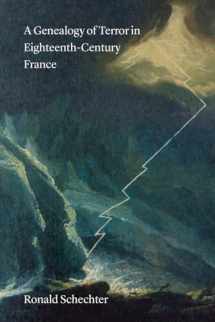
A Genealogy of Terror in Eighteenth-Century France
ISBN-13:
9780226499574
ISBN-10:
022649957X
Edition:
1
Author:
Ronald Schechter
Publication date:
2018
Publisher:
University of Chicago Press
Format:
Hardcover
304 pages
FREE US shipping
Book details
ISBN-13:
9780226499574
ISBN-10:
022649957X
Edition:
1
Author:
Ronald Schechter
Publication date:
2018
Publisher:
University of Chicago Press
Format:
Hardcover
304 pages
Summary
A Genealogy of Terror in Eighteenth-Century France (ISBN-13: 9780226499574 and ISBN-10: 022649957X), written by authors
Ronald Schechter, was published by University of Chicago Press in 2018.
With an overall rating of 4.0 stars, it's a notable title among other
books. You can easily purchase or rent A Genealogy of Terror in Eighteenth-Century France (Hardcover) from BooksRun,
along with many other new and used
books
and textbooks.
And, if you're looking to sell your copy, our current buyback offer is $0.72.
Description
In contemporary political discourse, it is common to denounce violent acts as “terroristic.” But this reflexive denunciation is a surprisingly recent development. In A Genealogy of Terror in Eighteenth-Century France, Ronald Schechter tells the story of the term’s evolution in Western thought, examining a neglected yet crucial chapter of our complicated romance with terror. For centuries prior to the French Revolution, the word “terror” had largely positive connotations. Subjects flattered monarchs with the label “terror of his enemies.” Lawyers invoked the “terror of the laws.” Theater critics praised tragedies that imparted terror and pity. By August 1794, however, terror had lost its positive valence. As revolutionaries sought to rid France of its enemies, terror became associated with surveillance committees, tribunals, and the guillotine. By unearthing the tradition that associated terror with justice, magnificence, and health, Schechter helps us understand how the revolutionary call to make terror the order of the day could inspire such fervent loyalty in the first place—even as the gratuitous violence of the revolution eventually transformed it into the dreadful term we would recognize today. Most important, perhaps, Schechter proposes that terror is not an import to Western civilization—as contemporary discourse often suggests—but rather a domestic product with a long and consequential tradition.


We would LOVE it if you could help us and other readers by reviewing the book
Book review

Congratulations! We have received your book review.
{user}
{createdAt}
by {truncated_author}


